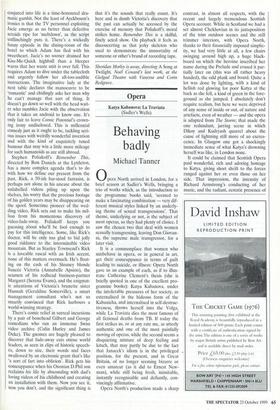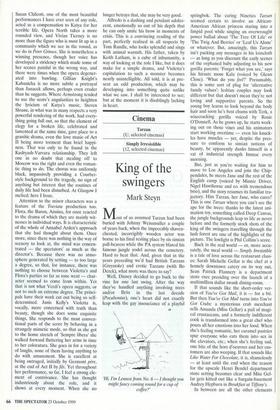Opera
1%40,a Kabanova; La Traviata (Sadler's Wells)
Behaving badly
Michael Tanner
Opera North arrived in London, for a brief season at Sadler's Wells, bringing a trio of works which, as the introduction to the programme books said, 'seemed to make a fascinating combination — very dif ferent musical styles linked by an underly- ing theme of sexual transgressions'. That theme, underlying or not, is the subject of most operas, so they had plenty of choice. I saw the chosen two that deal with women sexually transgressing, leaving Don Giovan- ni, the supreme male transgressor, for a later visit.
It is a commonplace that women who misbehave in opera, or in general in art, get their comeuppance in terms of guilt leading to suicide, or illness: Opera North gave us an example of each, as if to illus- trate Catherine Clement's thesis (she is briefly quoted in one of the excellent pro- gramme books): Katya Kabanova, under the intolerable pressures of her society, as externalised in the hideous form of the Kabanicha, and internalised in self-destruc- tiveness, throws herself into the Volga. while La Traviata dies the most famous of all fictional deaths from TB. If today the first strikes us, or at any rate me, as utterly authentic and one of the most painfully moving of operas, while the second seems a disquieting mixture of deep feeling and kitsch, that may partly be due to the fact that Janacek's idiom is in the privileged position, for the present, and in Great Britain, of no longer seeming bizarre or even amateur (as it did to Ernest New- man), while still being fresh, inimitable, instantly recognisable and defiantly, con- vincingly affirmative.
Opera North's production made a sharp contrast, in almost all respects, with the recent and largely tremendous Scottish Opera account. While in Scotland we had a set almost Chekhovian in its juxtaposition of the trim outdoor scenes and the still trimmer interiors, with Opera North, thanks to their financially imposed simplic- ity, we had very little at all, a few chairs swinging around high up, a huge black- board on which the heroine inscribed her name during the Prelude and erased it par- tially later on (this was all rather heavy handed), the odd plank and board. Quite a lot was done by lighting, with a kind of hellish red glowing for poor Katya at the back as she fell, a kind of green in the fore- ground as she jumped. I absolutely don't require realism, but here we were deprived of any sense of inside or out, of nature and artefacts, even of weather — and the opera is adapted from The Storm; that made the one redundant, jarring scene in which Dikoy and Kudryash quarrel about the cause of lightning still more of an excres- cence. In Glasgow one got a shockingly immediate sense of what Katya's drowning herself was like, in London none.
It could be claimed that Scottish Opera paid wonderful, rich and adoring homage to Katya, giving short shrift to the forces ranged against her or even those on her side. That impression, the intensity of Richard Armstrong's conducting of her music, and the radiant, ecstatic presence of Susan Chilcott, one of the most beautiful performances I have ever seen of any role, acted as a compensation to Katya for her terrible life. Opera North takes a more rounded view, and Vivian Tierney is no more than the figure who is most lit up in a community which we see in the round, as we do in Peter Grimes. She is nonetheless a winning presence, though her voice has developed a stridency which made some of her scenes painful in the wrong way, and there were times when the opera degener- ated into bawling. Gillian Knight's Kabanicha is no more subtle a portrayal than Janacek allows, perhaps even cruder than he suggests. Where Armstrong tended to use the score's angularities to heighten the lyricism of Katya's music, Steven Sloane, in what was in many respects a very powerful rendering of the work, had every- thing going full out, so that the element of elegy for a broken life, celebrated and lamented at the same time, gave place to a granitic drama, even the love music of Act II being more torment than brief happi- ness. That was only to be found in the Kudryash-Varvara relationship. They left one in no doubt that stealing off to Moscow was the right and even the roman- tic thing to do. The chorus was uniformly black, impassively providing a Courbet- style background to the tragedy, no sign of anything but interest that the routines of daily life had been disturbed. At Glasgow I melted; here I froze.
Attention to the minor characters was a feature of the Traviata production too. Flora, the Baron, Annina, for once reacted to the drama of which they are mainly wit- nesses in individual ways. It is characteristic of the whole of Annabel Arden's approach that she had thought about them. Once more, since there was nothing in the way of scenery to look at, the mind was concen- trated — the spectators' as much as the director's. Because there was no atmo- sphere generated by setting — to too large a degree, so that, for instance, there was nothing to choose between Violetta's and Flora's parties so far as tone went — char- acter seemed to come from within. Yet that is not what Verdi's opera suggests, or not to such an extreme degree. The princi- pals have their work cut out being so self- determined. Janis Kelly's Violetta is, vocally, more concerned with truth than beauty, though she does some exquisite things. She responds to the most conven- tional parts of the score by behaving in a strangely mimetic mode, so that as she got to the home stretch of `Sempre libera' she walked forward fluttering her arms in time to her coloratura. She goes in for a variety of laughs, none of them having anything to do with amusement. She is excellent at being outraged, initially by Germont pere, at the end of Act II by fi/s. Yet throughout her performance, so far, I feel a strong ele- ment of contrivance. She has thought industriously about the role, and it shows at every moment. When she no longer betrays that, she may be very good.
Alfredo is a dashing and petulant adoles- cent, emotionally so out of his depth that he can only smite his brow in moments of crisis. This is a convincing reading of the part, perfectly realised in all respects by Tom Randle, who looks splendid and sings with animal warmth. His father, taken by Keith Latham, is a cube of inhumanity, a way of looking at the role I like, but it does make for a simple drama, and Violetta's capitulation to such a monster becomes nearly unintelligible. All told, it is at pre- sent an odd production, which may be developing into something quite unlike what we saw. I shall be interested to see; but at the moment it is disablingly lacking in heart.



















































































 Previous page
Previous page